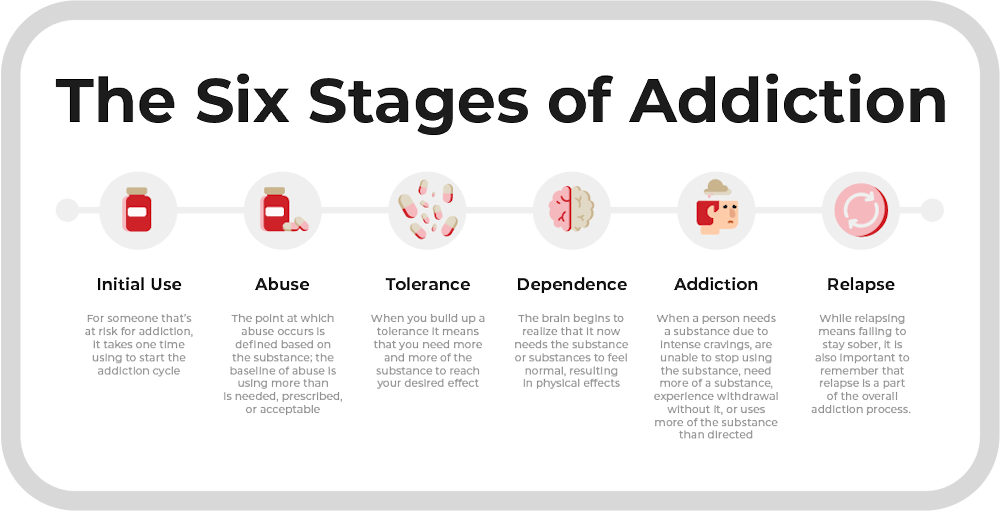Over the years the perception of addiction has changed. More and more people are learning that addiction is not a choice and that it is a disease. Unfortunately, there are still people out there that look at addiction as a character flaw and not as something that a person has to live with.
Addiction impacts every person differently. How one person might struggle with and handle their addiction might not be the same as another person, even if they are struggling with the same or similar substances. Most people battling addiction might notice the same pattern or cycle of addiction. In this article, we will be discussing the six stages of the addiction cycle.
If you or a loved one is dealing with substance use or addiction, don’t hesitate to visit our website and learn about our treatment options.

Most people don’t really think about the possibility of addiction when they try a substance of abuse for the first time. In fact, in some cases, the first time someone uses the substance is for a legitimate medical reason via a doctor’s prescription. Other times someone might try a sip of alcohol or take a pill just to see what happens.

Regardless of the reason for trying the substance, it is important to know how severe the consequences may be. For someone who is at high risk of developing an addiction, sometimes all it takes is one try of a substance to start the addiction cycle.
Factors that may lead to a higher risk of developing an addiction include
- A family history of substance abuse and/or mental health disorders
- Growing up in an environment of abuse or neglect
- Suffering from mental health issues
- Growing up in an environment where substance use was common
Abuse
The point at which a substance is being abused is defined based on the substance itself. For an illicit substance or a substance that has little to no legal or medical purpose such as heroin, it is considered substance abuse the first time someone uses it. Other substances can be obtained legally, either over the counter (alcohol, tobacco, etc) or via a doctor’s prescription. This is not considered to be abuse until the substance is taken in ways other than directed or to achieve a specific feeling.
Some common examples of abusing a legal substance include:
- Taking a higher dose than recommended
- Taking a drug more often than recommended
- Drinking for the sole purpose of getting drunk or catching a buzz
- Continuing to take a substance even after you are no longer being prescribed it
- Using a legal substance as a form of self-medicating
Tolerance
For example, if you had been taking 10mg of a prescription drug, over time you might notice that in order to feel the way you used to feel when taking 10mg, you now have to take 15mg or 20mg.
Tolerance is the result of the chemical changes to the brain that occur as the result of continuing to use and abuse whatever substance or substances you are taking. It’s these chemical changes that result in you needing to take more of the substance to reach your desired effects.
Tolerance isn’t a one-time thing either. As you continue to drink more or increase your dosage, your brain will then begin to build a tolerance to that new amount as well. This leads to even more consumption of a substance. When a person reaches a certain tolerance level, they might turn to even stronger and more dangerous substances in order to keep chasing the effect they are looking for.
Dependence
In fact, when the substance begins to wear off and leave the body, the brain will rebel in the form of withdrawal symptoms until it gets what it wants again. Some of these withdrawal symptoms include:
- Anxiety
- Nausea
- Depression
- Anger or hostility
- Fatigue
- Insomnia
- Aches and pains
- Vomiting
- Diarrhea
In addition to experiencing these withdrawal symptoms, someone dependent on a substance of abuse will often experience intense cravings and even be preoccupied with the thought of taking the substance next, to the point where it can negatively impact their everyday life such as work or school and have an adverse effect on their relationships.
It’s important to note that someone can be dependent on a substance and not necessarily be suffering from addiction. This is true for someone who is taking a prescription to address an ailment or a medical condition. They can be dependent on the drug in order to function properly but not be addicted to it.

Addiction
- Intense cravings
- Using more of the substance than medically directed
- Being unable to stop using the substance
- Needing more of the substance to reach the desired effect
- Experiencing withdrawal symptoms when stopping
- Spending a significant amount of time finding the substance, using it, and recovering from using it
- Losing interest in previously enjoyable activities
- Experiencing relationship problems as a result of using
- Struggling at work or school
- Changes in personal hygiene
- Continuing to use the substance despite the negative effects
- Using the substance in dangerous situations
If you are experiencing 2-3 of these symptoms you might be suffering from a mild form of addiction. 4-5 could mean a more moderate form of addiction. 6 or more could mean that you are suffering from a severe substance use disorder.
Regardless of the severity of the addiction, if you or a loved one is suffering from any type of substance abuse or addiction it is important to get the help that you need before it is too late.
Relapse
While yes, relapsing means failing to stay sober, it is important to remember that relapse is a part of the overall addiction process. It’s also important to remember that if you do relapse it is not an indication that you failed or that you are a failure.
Almost half of all people that are in recovery relapse at least once. If you do relapse it is important not to beat yourself up about it. Instead, look for ways that you can get the help that you need to get back on the right track.
At First City Recovery, we are here for you if you relapse. We offer relapse prevention techniques and resources to help you better understand why you relapsed in addition to helping you prevent another relapse in the future.
First City Recovery Center
- Cognitive Behavioral Therapy (CBT)
- Dialectical Behavioral Therapy (DBT)
- Group Therapy
- Family Therapy
- Experiential Therapy
We use these therapies and our other programs to treat a wide variety of addictions, including
- Alcohol
- Cocaine
- Heroin
- Fentanyl
- Meth
- Opioids
- Prescription drugs
- Tramadol
- Xanax
Are You In the Addiction Cycle?
If you or someone you know is suffering from substance abuse, dependency, or addiction, contact us today. At First City Recovery we can help you break the cycle of addiction and get started on the road to recovery.


















